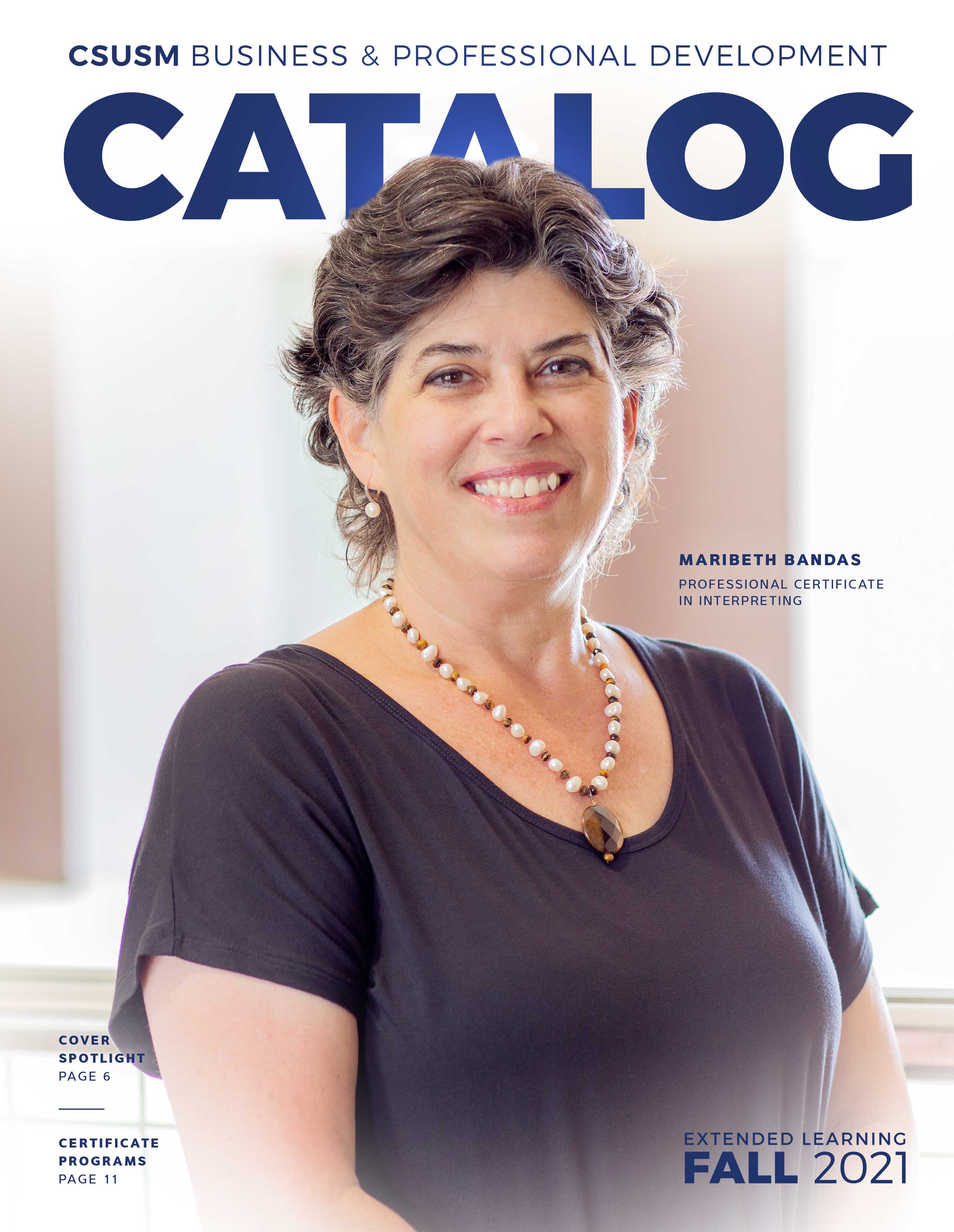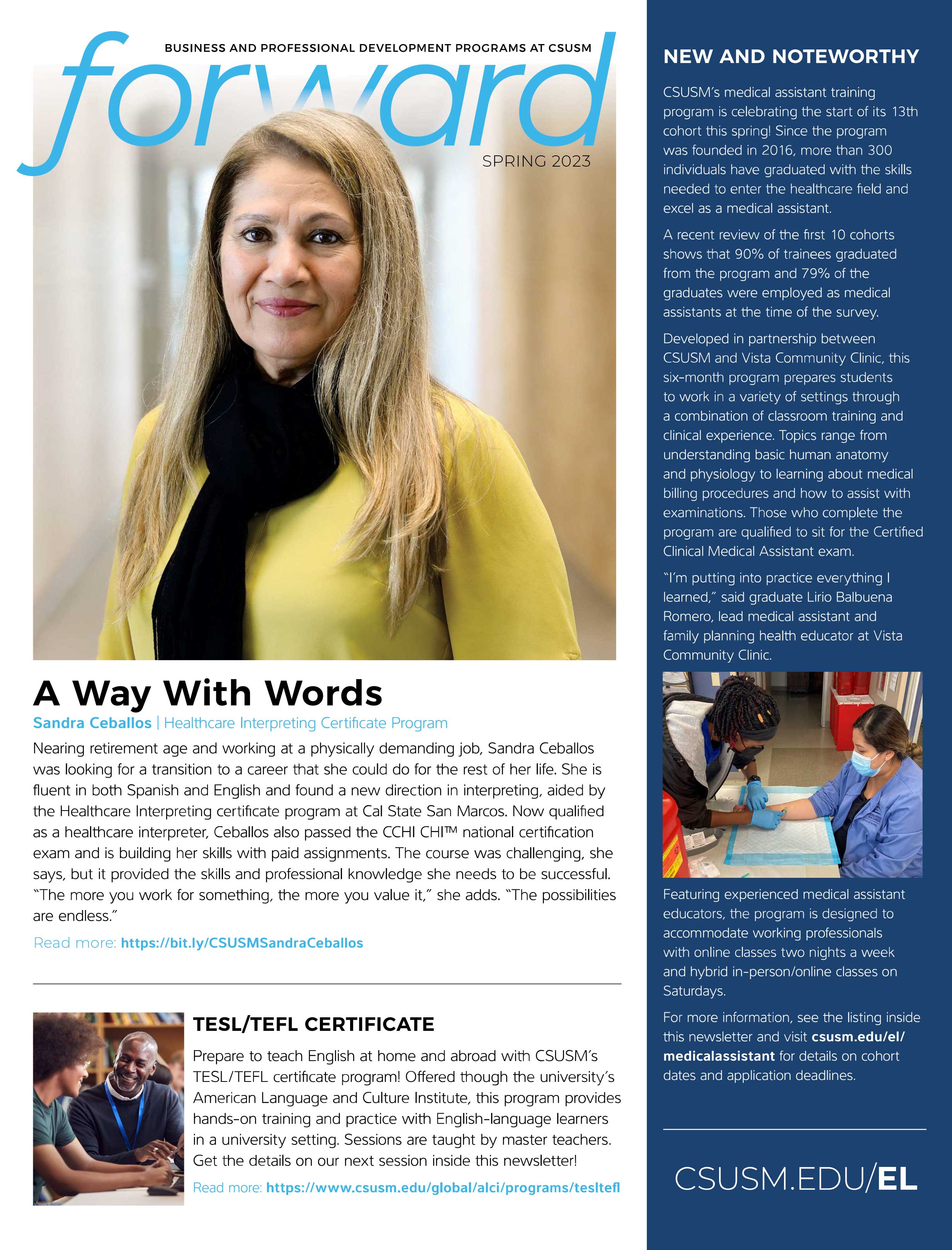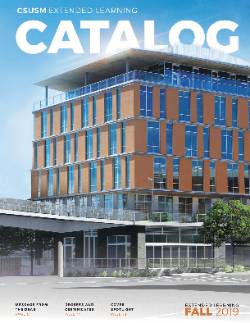 myCSUSM
myCSUSMBecome a Professional Healthcare Interpreter
Overview
If you are bilingual and working in a position that may require you to be a liaison to someone who has limited or non-English-speaking proficiency, this program will give you the skills to become an invaluable resource to your patients, community and organization.
Program FlierRequest InformationStudent Testimonials
CSUSM also offers a Community Interpreting program.
Program Details
- AUDIENCE
This program is designed for:
- Those who speak English and at least one other language and who are looking to start or advance their career
- Those working in healthcare or another industry that serves non-English-speaking customers or patients
- Those responsible for ensuring your organization provides language-accessible services to all patients
- SCHEDULE, REGISTRATION & FEES
Registration Dates Course Dates Registration Healthcare Interpreting
Sept. 9 - Dec. 18, 2024
Course Details
- Classes held on Mondays and Wednesdays from 6:00 - 8:00 p.m.
- Classes will be held virtually using Zoom
- CSUSM Community Container will be used for online resources
Fees
- Program fee is $1,699
- Online language assessment and textbooks are NOT included in the program fee
Textbooks
You should purchase the three required materials directly from Cross Cultural Communications. When you order, include the priority code: ACADEMIC20 to receive a 20% savings (tax and shipping charges apply). E-book options are available as well.
- Medical Terminology for Interpreters (4th ed.): A Handbook
Publisher: Culture & Language Press
ISBN: 978-0-9966517-7-6
$60.00 - Book: The Community Interpreter - An International Textbook
Publisher: Culture & Language Press
ISBN: 978-0-9823166-7-2
$120.00 - Book: The Community Interpreter: An International Workbook of Activities and Role
Plays
Publisher: Culture & Language Press
ISBN: 978-0-9966517-0-7
$60
Online Language Assessment
Refer to FAQ section for information on the online language assessment requirement.
Savings
- CSUSM alumni and students receive a 15% savings (email professionaldevelopment@csusm.edu for your savings code)
- MyCAA and WIOA funding approved
- View veteran and military funding options
Please note: All rates are subject to change without notice.
- ONLINE LANGUAGE ASSESSMENT INFORMATION
Online Language Assessment Information
Prior to taking the online language assessment, please contact the program coordinator, Chelsey Novak at cnovak@csusm.edu, with the following information.
- The high school from which you graduated
- The city, state, and country in which the high school is located
- The primary language you spoke at the time of graduation
- The secondary language you speak
Do I have to take an online language proficiency assessment?
Yes, each student must take an online language proficiency assessment.
CSUSM has contracted with Language Training International, a ACTFL Language Testing Center, to administer the online language proficiency assessment. Exam fee is $108. It is encouraged that all students take their language assessment prior to starting the program. The following languages are currently available: Arabic, Chinese Mandarin, English, French, German, Italian, Japanese, Korean, Pashto, Persian, Portuguese, Portuguese-Brazilian, Russian, Spanish, and Tagalog. If additional languages are requested or there are questions about the exam, please email professionaldevelopment@csusm.edu.
Students must pass their exams with a rating of Advanced Mid-Level. REGISTER FOR YOUR EXAM directly with Language Training International.
CSUSM does not schedule these exams.
- COURSE TOPICS
This 14-week program is designed to provide the basics of healthcare interpreting for bilingual participants who speak English and any additional language. The program covers ethics, skills and protocols required of interpreters. Class discussions and content cover the various modes of interpretation, codes of ethics and standards of practice required for aspiring healthcare interpreters.
The program uses the comprehensive learning content and materials developed by Cross-Cultural Communications (CCC), a program recognized nationally and internationally for healthcare interpreters in the United States.
Additional topics covered in the course include: positioning, terminology, steps for sight translation, intervention strategies and scripting, cultural mediation and other vital skills and protocols. Content is designed to include decision-making tools to help you make on-the-spot judgment calls in your daily work environment. The dynamic classroom experience of this course includes role-playing, individual and group activities rooted in real-world practice and immediate job application and relevance.
- INSTRUCTORS
Maribeth Bandas is vice president of BEAM Translation and Media Corporation in San Diego and director of translation services for the Hispanic Link Legacy Project. Maribeth is a certified translator and a licensed lead trainer of community and medical interpreters with 25 years of experience as a professional translator and Spanish instructor. She is licensed to teach The Community Interpreter (CI-000134-01 Cross Cultural Communications). Maribeth has trained students in the MA Program in Translation at the University of Puerto Rico through extended learning internships. She has taught English at the Pontificia Universidad Católica del Peru, and Spanish at the University of Texas, Austin, at Cibeles Internacional, Madrid, Spain; and at Georgetown University, The World Bank and The George Washington University. In addition, she served as translator for the Washington, D.C., Mayor’s Office and as consultant for the Center for Applied Linguistics and evaluator for the National Assessment of Educational Progress.
“Professionally trained interpreters provide accurate, confidential and cost-saving support to the organizations and institutions that employ them. Effective communication reduces medical errors, increases patient satisfaction, saves costs on unnecessary testing and much more.”
If you are interested in sharing your knowledge and expertise with our students, consider submitting an instructor application or course proposal for consideration. Please contact Cathy Scavone at cscavone@csusm.edu or 760-750-8706 for more information.
- FAQ
Are there any prerequisites?
Each student must take an online language proficiency assessment.
Prior to taking the online language assesment, please contact our Coordinator Chelsey Novak at cnovak@csusm.edu with the following information.
- The high school from which you graduated
- The city, state, and country in which the high school is located
- The primary language you graduated in
- The secondary language you speak
Do I have to take an online language proficiency assessment?
Yes, each student must take an online language proficiency assessment
CSUSM has contracted with Language Training International, a ACTFL Language Testing Center, to administer the online language proficiency assessment. Exam fee is $108. It is encouraged that all students take their language assessment prior to starting the program. The following languages are currently available: Arabic, Chinese Mandarin, English, French, German, Italian, Japanese, Korean, Pashto, Persian, Portuguese, Portuguese-Brazilian, Russian, Spanish and Tagalog.
If additional languages are requested or there are questions about the exam, please email professionaldevelopment@csusm.edu.
Students must pass their exams with a score of Advanced Mid-Level score. REGISTER FOR YOUR EXAM directly with Language Training International. CSUSM does not schedule these exams.
- View tips for taking the ACTFEL Proficiency Test
- Watch a walkthrough of the Remotely Proctored Language Assessments offered by LTI
What does a healthcare interpreter do?
Interpreters are skilled at converting meaning from one spoken language to another. Healthcare (or medical) interpreters and translators have an important role in facilitating communication for non-English-speaking patients and family members because they allow doctors, nurses and other medical staff to communicate effectively and accurately with their patients. Healthcare interpreters must be sensitive to patients’ personal circumstances and maintain high levels of confidentiality and ethical standards.
Healthcare Interpreters are often found in a variety of healthcare-related settings such as hospitals, clinics, private practice, specialty care clinics, pharmacies, occupational therapy sites and community resource departments, and they may be employed in roles such as front office, in-room assistants, technicians and other medical staff. Interpreters may work in departments such as diabetes education, urgent or acute care, doctor’s visits, health fairs, physical therapy, women’s or pediatric services.
Will I be certified if I pass the class?
After you successfully attend all course sessions, pass the two-hour written assessment and provide documentation of passing the individual language proficiency exam, you will be qualified as a healthcare interpreter and you will receive a Professional Certificate in Healthcare Interpreting from California State University San Marcos. You may use proof of successfully passing the classroom training and language proficiency exam if you choose to apply for the national certification exam for medical interpreters through the National Board for Certified Medical Interpreters or Certification Commission for Healthcare Interpreters.
National Certification Websites:
What services do you offer to active military, veterans and dependents?
Please visit our military and veteran services page to learn how we can help.
How can I be considered for an instructor position or send in a course proposal?
Thank you for your interest in becoming an instructor! Please contact Cathy Scavone (cscavone@csusm.edu) to receive an application and course proposal form.
How often do I need to come to campus for classes?
Students are typically asked to come to campus two evenings per week for classes.
According to the Bureau of Labor Statistics, employment of trained interpreters and translators is projected to grow 29 percent from 2014 to 2024
Learn from licensed industry professionals who teach the program and facilitate interactive exercises and lectures
This program is designed to help you learn faster with comprehensive study materials and interactive class structures
Help facilitate communication for your non-English-speaking patients and family members with doctors, nurses and other medical staff
I train the (new interpreters), and I learned a lot about how to do it professionally by getting the certificate. This class improved my skills and gave me the tools and guidelines to follow.
Professionally trained interpreters provide accurate, confidential and cost-saving support to the organizations and institutions that employ them. Effective communication reduces medical errors, increases patient satisfaction, saves costs on unnecessary testing and much more.
Extended Learning













